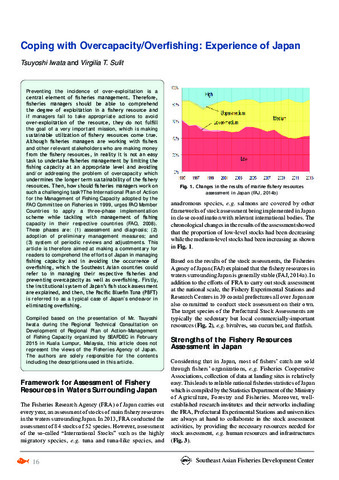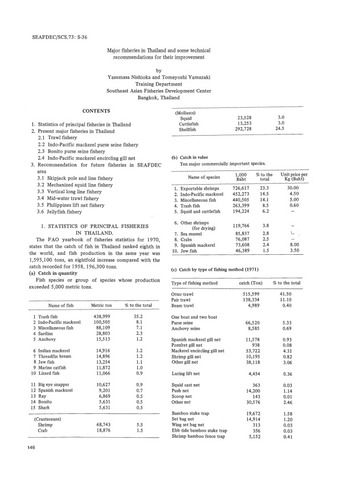Coping with overcapacity/overfishing: Experience of Japan

ရက်စွဲ
2016Page views
1,747
Share
စိတ္တဇ
Preventing the incidence of over-exploitation is a central element of fisheries management. Therefore, fisheries managers should be able to comprehend the degree of exploitation in a fishery resource and if managers fail to take appropriate actions to avoid over-exploitation of the resource, they do not fulfill the goal of a very important mission, which is making sustainable utilization of fishery resources come true. Although fisheries managers are working with fishers and other relevant stakeholders who are making money from the fishery resources, in reality it is not an easy task to undertake fisheries management by limiting the fishing capacity at an appropriate level and avoiding and/or addressing the problem of overcapacity which undermines the longer term sustainability of the fishery resources. Then, how should fisheries managers work on such a challenging task? The International Plan of Action for the Management of Fishing Capacity adopted by the FAO Committee on Fisheries in 1999, urges FAO Member Countries to apply a three-phase implementation scheme while tackling with management of fishing capacity in their respective countries (FAO, 2008). These phases are: (1) assessment and diagnosis; (2) adoption of preliminary management measures; and (3) system of periodic reviews and adjustments. This article is therefore aimed at making a commentary for readers to comprehend the efforts of Japan in managing fishing capacity and in avoiding the occurrence of overfishing, which the Southeast Asian countries could refer to in managing their respective fisheries and preventing overcapacity as well as overfishing. Firstly, the institutional system of Japan's fish stock assessment are explained, and then, the Pacific Bluefin Tuna (PBFT) is referred to as a typical case of Japan's endeavor in eliminating overfishing.
Suggested Citation
Iwata, T., & Sulit, V. T. (2016). Coping with overcapacity/overfishing: Experience of Japan. Fish for the People , 14(1), 16-20. http://hdl.handle.net/20.500.12066/977
ဘာသာရပ်
စုစည်းမှုများ စုစည်းမှုများ
Related items
Showing items related by title, author, creator and subject.
-
The Status of Fisheries in the Republic of Maldives
Faiz, Mohamed (Training Department, Southeast Asian Fisheries Development Center, 1997)The paper discusses the tuna fisheries in Maldives which dominates its fishing industry. Apart from a very strong domestic market, tuna is also the main export commodity of the country. Moreover, reef fisheries such as, ... -
Major fisheries in Thailand and some technical recommendations for their improvement
Nishioka, Yasumasa; Yamazaki, Tomeyoshi (Japan International Cooperation Agency, 1977)Presented in this paper is the development of fisheries industry in Thailand. The data on the production of the principal fisheries species and major fishing methods are also presented. Also included are the recommendations ... -
Status of Fishing Conditions in Cambodia
Sour, Kim; Vuthy, Ros (Training Department, Southeast Asian Fisheries Development Center, 1997)Fisheries in plays a very important role in Cambodia’s national economic development. Total fish catch production in 1996 was 104 310 tones, about which 60% was contributed by inland capture fisheries, 30% by marine capture ...




